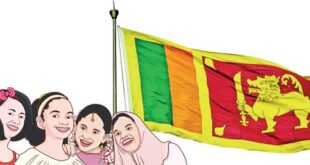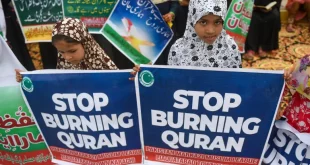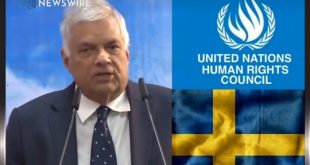The enormity of the carnage that visited the civilians at the Meena Bazaar in Peshawar on Wednesday is certainly not going to be Pakistan’s last.
The blast at a bazaar that sells largely women merchandize, some say, was an attack on Pakistan’s way of life. But the picture behind the horror is more complex and has many hands behind it.
 The enemy is targeting schools. Many a girl school in the enemy-dominated areas have been attacked or closed. Co-ed schools in other parts of the country, including the heavily-guarded capital, have received threats. Reports say many private schools have installed CCTV cameras, deployed snipers and placed sandbags around their buildings with local police patrolling the area during school hours. The obvious suspect is the fundamentalist Taliban. But the fact that a car carrying huge amounts of explosives had reached the market in spite of tight security and the militants’ success in carrying out a series of attacks in recent weeks raise many questions with regard to the terrorist network. How can they be so efficient? Why the terrorists are lucky so many times?
The enemy is targeting schools. Many a girl school in the enemy-dominated areas have been attacked or closed. Co-ed schools in other parts of the country, including the heavily-guarded capital, have received threats. Reports say many private schools have installed CCTV cameras, deployed snipers and placed sandbags around their buildings with local police patrolling the area during school hours. The obvious suspect is the fundamentalist Taliban. But the fact that a car carrying huge amounts of explosives had reached the market in spite of tight security and the militants’ success in carrying out a series of attacks in recent weeks raise many questions with regard to the terrorist network. How can they be so efficient? Why the terrorists are lucky so many times?
It appears that the script of the horror that is unfolding in Pakistan is not written by Pakistanis, for no Pakistani would like to see his or her country being destabilized or devastated.
True, a majority of the Pakistanis, fed up with the terrorism that is destroying their country, back the military operation codenamed Rah-i-Nijat (Path to Deliverance). But they also ask how long they should wait or how bad the situation can become before the deliverance finally comes.
The Pakistani government apparently does not have the answer. It simply employs a strategy made in Washington. The common wisdom that Pakistan’s problems need solutions made in Pakistan appears to be lost on the government. The US strategy calls on Pakistan to destroy the miscreants among Waziristan’s Pashthun tribes, who are supportive of the Afghan Taliban forces now engaged in a battle to evict the US-NATO forces from their country. But Pakistan was asked to do the job only after the United States made the situation worse. Continuous and indiscriminate US drone attacks in Pakistan’s tribal areas and the North Western Frontier Province have killed more than 600 civilians since August last year. This has only pushed an already-pro-Taliban tribal population towards the extremists.
Former Pakistani President Pervez Musharraf resisted US pressure to launch an all-out war in the tribal areas. Despite his anti-democratic credentials during his final days in office, Musharraf was more circumspect than the present President, Asif Ali Zardari. Under pressure from the US, Musharraf launched limited operations against the militants but he was mindful that the situation warranted a Pakistani solution. So defying the hawkish administration of President George W. Bush in Washington, Musharraf signed agreements with tribal leaders in a bid to find a home-made solution to the crisis. He did not want an important segment of the Pakistani population alienated. After all, the Pashtuns were patriotic to the core. Besides he was also duty-bound to the pro-Taliban Islamist MPs who were propping up his government. He was also aware that the Hamid Karzai government in Kabul was pro-India and that Pakistani troops had a bigger responsibility in guarding the Kashmir border where some 400,000 Indian troops had been threatening Pakistan’s sovereignty.
But the Americans did not like Musharraf’s pact with the Pakistani Taliban. Since double-crossings and double-dealings were all part of the great game being played in Afghanistan and Pakistan by regional and global powers, it was no mystery why the Musharraf-Taliban agreement did not succeed.
The Zardari government too saw some wisdom in going for a deal with the Paksitani Taliban but his government was more vulnerable to external forces which were trying to destabilize Pakistan. It was no secret that India, Israel and the neoconservative elements in the US administration would like to see a weak and denuclearized Paksitan. They are also not happy with Pakistan’s close military, trade and political ties with China.
The Pakistani government and the military have expressed concern over some 26 Indian consulate offices in Afghanistan close to its border. Pakistan also sees an Indian hand in the simmering troubles in Baluchistan.
Israel and the neocons in the US want to see an end to Pakistan’s nuclear weapons. Thinking and planning in terms of a clash of civilisations, the neocons, in fact, had a map drawn, showing the borders of a balkanized Pakistan. The map annexes Pakistan’s North West Frontier Province with Afghanistan and the South West with a separate state called Baluchistan.
Amid these concerns, a disturbing news item posted this week on Pakistan’s alternative press raises more questions regarding the extent to which the foreign forces have penetrated the country. The story headlined ‘Americans dressed as Afghans caught with weapons in Islamabad’ was posted on websites such as pakalert.worldpress.com, paksitanidefence.com and defence.pk. The Islamabad-datelined story says:
“Four American citizens were caught red-handed by Capital Police early Tuesday for photographing sensitive buildings. All four were dressed in traditional Afghan outfits and were found to be in possession of illegal weapons and explosives.
“According to details, police personnel deployed here at Nawaz Chowk, sector F-8, intercepted two suspicious vehicles. During the search, police recovered weapons from their custody. The riders of these vehicles were found to be American citizens. They were all dressed as Afghans.
“The number plates on both vehicles (IDM 2030 & LG 501) were found to be fake. The police personnel called for backup when the Americans refused to allow them to search the car. High ranking Capital Police officials reached the site within minutes and had the vehicles searched, recovering two M-16A1 rifles, two handguns and two hand-grenades.
“The police held the American citizens in custody for an hour before the Interior Ministry intervened and had them released without charge even as preliminary investigation was being carried out.”
Some of these websites drew readers’ attention to an incident in the Iraqi city of Basra in 2005 when two British operatives dressed in local Arab dress were arrested by Iraqi police. The British operatives were carrying weapons, explosives and bomb detonators. Hours later, British tanks rammed into the building where the two operatives were being detained to rescue them after a gun battle with the Iraqi police.
When the Pakistani Interior Ministry was asked to comment on this story, it said there existed no law in Pakistan that might allow any foreigner or diplomat, including Americans, to move on busy roads of federal capital with illegal arms.
The websites also said that days before the incident involving the Americans, the City Police arrested two Dutchmen with illegal weapons. Soon after they were released after the Interior Ministry and the US embassy intervened, they were put on a plane and sent out of the country.
When on Wednesday, TV talk-show host Hamid Mir asked visiting US Secretary of State Hillary Clinton about the arrests of the Americans, she tactfully evaded the issue and commented on concerns over the US drone attacks.
Wednesday’s blast and the series of terror incidents that have been shaking Pakistan for the past three weeks or so almost on daily basis should be seen in the light of conspiracies aimed at destabilizing Pakistan.
These attacks also come against the backdrop of moves by the US administration to depoliticize Pakistan’s military. The Kerry-Lugar Bill that recently endorsed US$ 7.5 billion aid to Pakistan over the next five years only invites more questions with regard to the intentions of the United States. The Zardari government’s readiness to accept the conditions attached to the aid package has created a political crisis in Pakistan.
There is near unanimity in public opinion that the conditions are an insult to Pakistan’s dignity and a threat to its sovereignty. It implies that Pakistan is a state aiding terrorism and demands Pakistan to furnish sensitive information about its nuclear programme and people involved in it.
Another demand that Pakistan’s politics be demilitarized has caused ripples within the military top brass and soured military’s relations with the civilian government at a time when the military is going after the pro-Taliban militia in an all out war that began as America’s war and now rages as Pakistan’s war.
In this war, the people in Waziristan are suffering untold hardships and already some 200,000 people of the 500,000 population have fled the war zone.
The war is not the solution. It should not be waged to please the Americans for a few billion dollars. But Pakistani leaders need the American money though they are concerned about political stability and unity among the people. Can Pakistan strike a balance? However, for any solution to succeed, the Americans should leave Afghanistan.
 Sri lanka Muslims Web Portal Diversity and Inclusiveness
Sri lanka Muslims Web Portal Diversity and Inclusiveness



